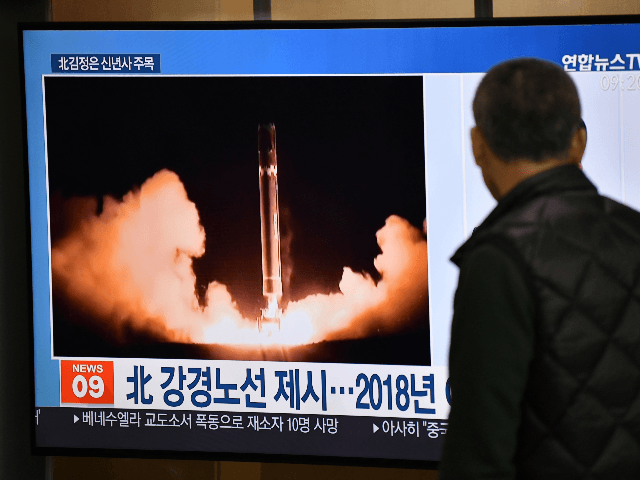An alleged United Nations report unearthed by Reuters on Monday concluded that at no time in 2019 did the communist regime in North Korea stop its nuclear weapons program, raising questions as to why allies Russia and China insisted the U.S. support relieving Pyongyang of those sanctions as a reward for halting nuclear development.
North Korea is currently under a strict sanctions regime that limits a sizeable portion of business dealings with the regime. Those sanctions were the product of the Trump administration galvanizing the United Nations Security Council in 2017 to act against Pyongyang in response to its most recent nuclear test, which may have destroyed the nation’s illegal testing site.
Russia and China have reportedly urged President Donald Trump to support lifting, or at least easing, some of the sanctions on North Korea to entice the communist regime to cease its belligerence against South Korea, Japan, and the United States. The Trump administration has declined to do so, instead increasingly applying sanctions to top communist officials and illicit behavior in North Korea from Washington.
Reuters’ revelations, allegedly from a “confidential U.N. report” written by an independent monitor of sanctions effectiveness, suggest that America’s refusal to lift sanctions, noting that North Korea had made no proactive steps towards peace, was justified.
“In 2019, the Democratic People’s Republic of Korea (DPRK) did not halt its illicit nuclear and ballistic missile programs, which it continued to enhance, in violation of Security Council resolutions,” Reuters quoted the report as saying. “Despite its extensive indigenous capability, it uses illicit external procurement for some components and technology.”
The report also claimed that North Korea had routinely violated economic sanctions, both importing and exporting banned products or banned amounts of key resources like oil. It also reportedly conducted over a dozen missile tests throughout 2019, including ballistic missiles.
North Korea signed an agreement with the United States – with which it has been technically at war since 1950 – after dictator Kim Jong-un met President Trump in Singapore in 2018. The agreement required both sides to work towards “denuclearization of the Korean peninsula,” but did not define the term. While Washington typically uses it to refer to an end to North Korea’s illegal nuclear program, Pyongyang interprets it as the removal of all American assets from Korea, as the U.S. is a nuclear power.
Since the agreement, North Korea has routinely, and abrasively, demanded sanctions relief. North Korean officials and state media have called the sanctions “ridiculous” and “murderous,” referred to President Trump as a “dotard,” and repeatedly used veiled language to threaten a military attack on the United States, including their unfulfilled promise to send America a “Christmas present” in December. North Korean cries for Trump to fire Secretary of State Mike Pompeo have also fallen on deaf ears.
Reports throughout 2019 warned, similar to the alleged U.N. report revealed this week, that North Korea was at best doing nothing to shut down its nuclear program. Satellite images indicated that Pyongyang’s main uranium enrichment plant remained active and that North Korea possessed still undeclared missile test sites. Experts predicted an increase in the number of nuclear weapons North Korea possessed by the end of the year.
Despite this, reports surfaced in December of a joint push by the United Nations envoys of China and Russia to pressure Washington to lift sanctions, claiming that North Korea had ceased its threatening behavior. The State Department responded to the report by insisting that “now is not the time for the U.N. Security Council to consider offering premature sanctions relief,” and the sanctions remain in place today.
America has since consistently added new sanctions against both North Korea and foreign businesses, particularly in China and Russia, that help North Korea defy sanctions. Last month, the Treasury Department sanctioned the Korea Namgang Trading Corporation for helping enrich the Kim regime and a Chinese company known as Beijing Sukbakso for helping Korea Namgang violate sanctions.
North Korea’s state media outlets have not at press time responded to the Reuters report. Rodong Sinmun, the official newspaper of the ruling communist Workers’ Party of Korea, published an article urging the country to invest in “science technology,” referring to it as a “strategic asset.”
“One of the targets of ruthless and persistent isolation schemes by hostile forces is no other than science technology field, which indicates that it has a hidden objective to make it hard for science technology to serve its intended role of providing a light on a shortcut toward progress and development,” Rodong Sinmun argued.

COMMENTS
Please let us know if you're having issues with commenting.